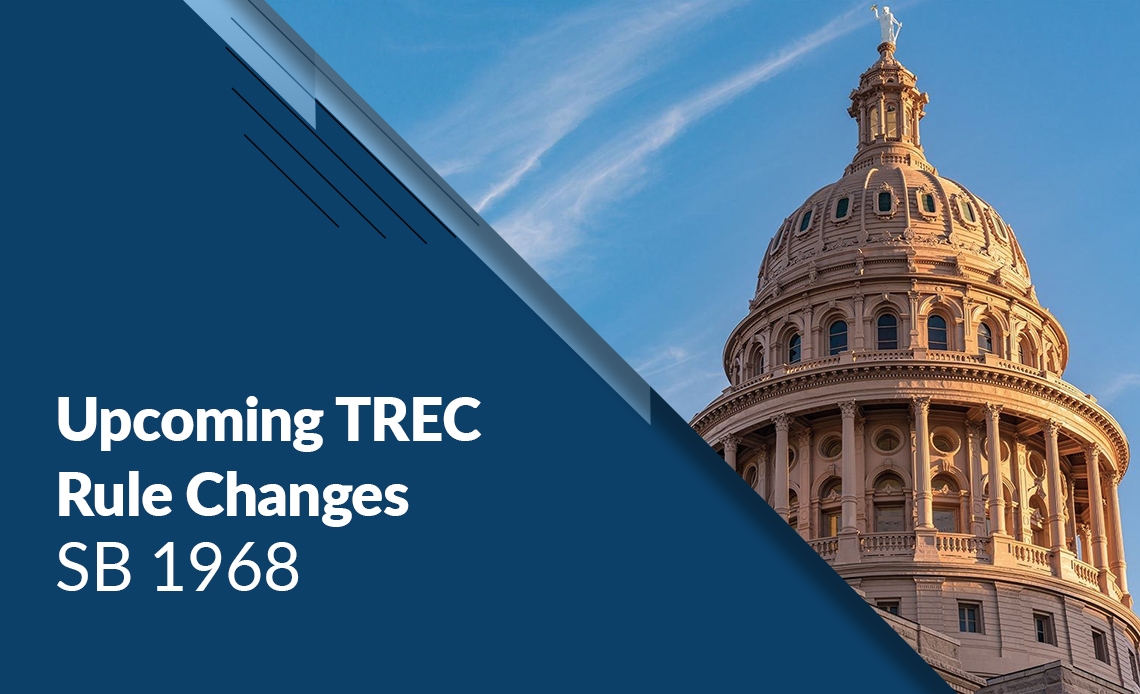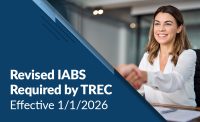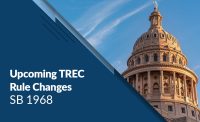SB 1968: Upcoming TREC Rule Changes

The Texas Legislature recently passed Senate Bill 1968, effective January 1, 2026. This bill amends key sections of the Texas Real Estate License Act (TRELA) and grants the Texas Real Estate Commission (TREC) authority to clarify and modernize rules around agency relationships, licensing, and disciplinary procedures.
While TREC calls SB 1968 its “housekeeping bill,” many of the changes are significant and will directly impact how brokers and agents conduct business in Texas. Below is a breakdown of the most important updates and what they mean for your daily operations.
Key Changes at a Glance
1. Elimination of Subagency
SB 1968 repeals references to subagency in Texas real estate law. This change aims to remove confusion over who represents whom in a transaction and to ensure that consumers clearly understand each agent’s role. Going forward, license holders will need a written agreement before representing a buyer or providing brokerage services.
2. “Showing Without Representation” Option
The bill creates a new framework that allows a broker or agent to show property without representing the party viewing it – provided certain conditions are met.
A broker may show property to a potential buyer without representation as long as:
- There is no oral or written agreement to represent the party.
- The broker does not provide advice or opinions about the property or real estate transactions.
- The broker performs no other acts of brokerage for that party during the showing.
This “showing-only” scenario allows brokers to accommodate unrepresented buyers while maintaining compliance — but it also introduces new compliance and liability considerations. Agents will need to be very clear about their role during any such showing.
3. Written Agreement Required Before Showing or Submitting an Offer
Once a broker or agent intends to act as a buyer’s representative — meaning they’ll give advice, prepare offers, or perform any brokerage service — SB 1968 now requires a written agreement before those services begin.
That agreement must be in place:
- Before showing the property if the agent will be representing the buyer, or
- Before making an offer on the buyer’s behalf.
That written agreement must clearly outline:
- The services the license holder will provide.
- The termination date of the agreement.
- Whether the agreement is exclusive or non-exclusive.
- Whether the license holder is representing the buyer or not.
- The amount or rate of compensation and how it’s determined.
- A statement that broker compensation is fully negotiable and not set by law.
This is one of the most impactful rule changes, and brokers should ensure all buyer-representation workflows and templates reflect this requirement well before the effective date.
4. Licensing and Supervision Updates
SB 1968 also revises several licensing and administrative provisions under TRELA.
Key highlights include:
- Broker Responsibility: The bill reinforces the supervising broker’s responsibility for all agents and associated brokers under their license.
- Contact Information: Licensees must maintain and update their business address, phone number, and e-mail address with TREC.
- Public Disclosure: TREC may publicly display each associated broker’s name alongside the broker with whom they are affiliated in the agency’s online license records.
These updates improve transparency and ensure TREC can communicate directly and accurately with all license holders.
5. Broker Notification of Complaints
TREC is now authorized to notify a sponsoring broker if a complaint is filed against one of their associated brokers or agents.
While specific details of the complaint will remain confidential, this early notification allows sponsoring brokers to manage compliance and risk more proactively.
6. Broker Responsibility Course: Now Required for All Brokers, Every Renewal
Effective January 1, 2026, the Broker Responsibility Course is required for every broker applicant and for every broker license renewal—regardless of whether the broker sponsors agents or supervises anyone. Delegated supervisors must still take the course as well. In short: all brokers take it every renewal, and new broker applicants must complete it before licensure.
Action for brokers: Build this into your CE planning now so your next renewal after Jan 1, 2026 includes the Broker Responsibility Course.
Why These Changes Matter
SB 1968 represents one of the most meaningful updates to Texas agency law in years. Here’s why it matters to you:
- Clearer agency relationships: Eliminating subagency and requiring written agreements provides greater clarity for both agents and consumers.
- Reduced confusion and risk: Brokers must ensure agents understand when they are acting as a representative versus when they’re simply showing a property.
- Enhanced oversight: With new public information requirements and complaint notifications, brokers will need stronger supervision and compliance systems.
- Operational changes: The requirement for a written agreement before showings or offers means existing workflows, templates, and client onboarding processes will need updating.
What Brokers and Agents Should Do Now
Here are practical steps to prepare for the new law before January 1, 2026:
- Update Buyer-Representation Agreements
Ensure all agreements meet the new statutory requirements — including clear services, termination dates, exclusivity, and compensation disclosures. - Create a Policy for “Showings Without Representation”
If your brokerage chooses to allow this, define exactly what agents may or may not say or do during such showings. Document this policy internally. - Audit and Update Brokerage Forms
Review templates, listing agreements, and onboarding materials to ensure full compliance with SB 1968. - Train Agents on New Agency Definitions
Educate your team on the difference between representation, showing-only, and customer interactions. Missteps here could lead to disciplinary issues. - Strengthen Internal Supervision
Since TREC can now notify brokers of complaints, ensure you have clear protocols for response, documentation, and corrective action. - Verify License Information with TREC
Check that all contact details and associated-broker information are current and accurate in TREC’s system. - Stay Alert for Additional Rulemaking
TREC will issue formal rules interpreting SB 1968 before the law takes effect. Watch for updates in TREC newsletters and commission meetings.
Effective Date and Timeline
SB 1968 was enacted by the 89th Texas Legislature and takes effect January 1, 2026.
While the law itself is final, TREC’s detailed rulemaking is expected throughout 2025. Brokers and agents should begin preparing now to update agreements, training, and compliance policies.
You Might Also Like
Join Our Newsletter
Get the latest updates delivered right to your inbox










